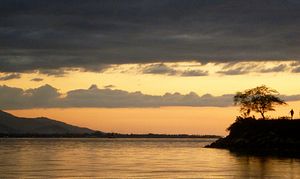Flash floods and landslides have killed at least 44 people on the Indonesian island of Flores, while at least 21 people have been confirmed dead in neighboring Timor-Leste.
Raditya Jati, a spokesperson for Indonesia’s disaster management agency said in addition to the deaths, several people have been injured while others remain missing.
“Dozens of houses were buried in mud in Lamanele village…residents’ houses washed away by the flood,” he said in a statement.
In Timor-Leste, Deputy Prime Minister Jose Reis said it’s the worst incident to hit the country in 40 years.
Much of Dili, the capital of Timor-Leste, has been left heavily flooded after the Comoro river burst its banks following three days of heavy rain over Easter weekend.
Timor-Leste’s Civil Protection Agency told Lusa newswire service that it was difficult to take full stock of the situation and determine the full number of casualties because “the whole city is a disaster zone.”
Posts on social media show entire buildings being swept down the Comoro river, water reaching the roofs of buildings in the center of the city and thousands of people fleeing the city with few belongings.
In addition to the devastation in Dili, a landslide buried a family of five, including three children, in the sub-district of Remexio, south of the capital.
The devastation has made the country’s efforts to combat rising COVID-19 infections that much more difficult. Dili, along with the cities of Baucau and Viqueque were ordered into lockdown last month following a surge in community transmission.
Jose Sousa-Santos, a security expert, tweeted Monday morning that: “The number of people leaving Dili for the districts is growing. The next big risk will be the spread of Covid throughout the country as the lockdown in Dili is now ineffectual.”
As of late February, the country had recorded fewer than 100 total cases of COVID-19, but since then the number has reached more than 700. Alex Tilman, a United Nations development coordinator in Timor-Leste, told an Australian newspaper on Sunday that the floods have opened another front in the battle against COVID-19.
“Many of the roads have been destroyed, bridges are also destroyed, there are a lot of houses going under water. I think the extent of it will be really great,” he said. “And this is on top of the Covid-19 crisis that we are facing…The vaccine is due tomorrow, but the airport is also prone to flooding so with this much rain, if the water does not recede from the airport by tomorrow, I don’t know how the plane is going to be able to land.”
By Monday morning, however, the skies had cleared, and the flood receded enough for the flight to land, with 24,000 COVID-19 vaccines on board.
Timor-Leste’s Vice Minister for the Interior Antonio Armindo stated Sunday evening that there were at least 6,000 displaced people. That number is likely to have grown significantly since, causing fears of how easily the virus will spread if people aren’t able to keep socially distanced in evacuation shelters.
In another hit to the country’s efforts to combat rising COVID-19 infections, Tilman published images on Twitter showing how the SAMES warehouse, where the country’s medical supplies are kept and distributed from, had been flooded.
“The Covid-19 vaccine, planned to arrive tomorrow, is supposed to be kept here,” he wrote Sunday. “It’s flooded and staff are trying to save what they can.”
Australia’s Department of Foreign Affairs and Trade in a statement said: “Our thoughts and condolences are with the people of Timor-Leste following severe flooding in Dili and other parts of the country”
“Australia is providing immediate support to the Timor-Leste governments, and we stand ready to assist the Government and people of Timor-Leste in response to further requests for assistance.”
Roy Trivedy, the U.N. resident coordinator, said the United Nations was deeply saddened by the loss of lives and infrastructure and stands ready to assist.
“As an emergency response measure, the United Nations extends full support to the people and Government of Time-Leste in this hour of need. We are deeply concerned about the communities, especially women and children, who are often most affected by natural disasters. We will work with authorities to mobilise all possible resources to support the response,” he said.

































